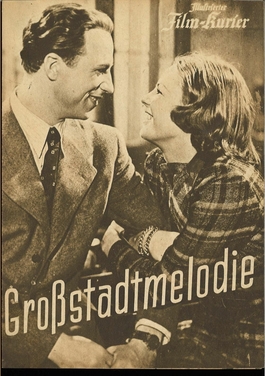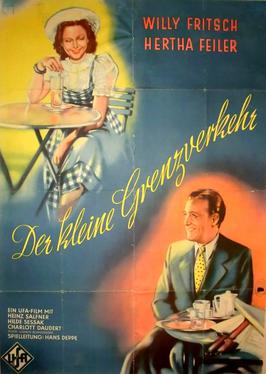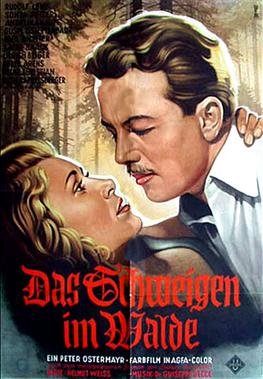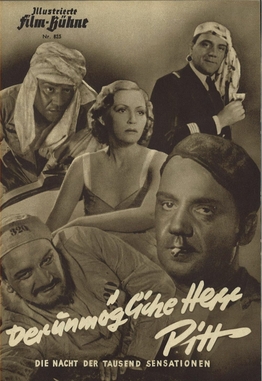
Old Heidelberg is a 1959 West German drama film directed by Ernst Marischka and starring Christian Wolff, Gert Fröbe and Sabine Sinjen. It is an adaptation of the 1901 play Old Heidelberg by Wilhelm Meyer-Förster.

Melody of a Great City is a 1943 musical drama film directed by Wolfgang Liebeneiner and starring Hilde Krahl, Werner Hinz and Karl John. A young woman moves to Berlin to work as a press photographer.
Diesel is a 1942 German biographical film directed by Gerhard Lamprecht and starring Willy Birgel, Hilde Weissner, and Paul Wegener. It portrays the life of Rudolf Diesel, the German inventor of the diesel engine. It was one of a series of prestigious biopics made in Nazi Germany portraying genius inventors or artists struggling against the societies in which they live. The film was based on a biography by Eugen Diesel, one of Diesel's children.

Don't Promise Me Anything is a 1937 German comedy film directed by Wolfgang Liebeneiner and starring Luise Ullrich, Viktor de Kowa and Heinrich George. It was partly shot at the Grunewald Studios in Berlin. The film's sets were designed by the art directors Karl Weber and Erich Zander. The Berlin premiere took place at the Gloria-Palast. In 1950 Liebeneiner remade the film as When a Woman Loves with Hilde Krahl and Johannes Heesters in the lead roles.

A Salzburg Comedy or Little Border Traffic is a 1943 German comedy film directed by Hans Deppe and starring Willy Fritsch, Hertha Feiler and Heinz Salfner. Erich Kästner wrote the screenplay based on one of his own novels. As he had been blacklisted by the Nazi Party, he used the pseudonym Berhold Bürger. The novel was again adapted for the 1957 film Salzburg Stories.

When Women Keep Silent is a 1937 German comedy film directed by Fritz Kirchhoff and starring Johannes Heesters, Hansi Knoteck and Friedrich Kramer. A newly married couple become involved in a series of marital differences, largely due to misunderstandings.

His Late Excellency is a 1935 German historical comedy film directed by Hans H. Zerlett and starring Arthur Schroder, Rose Vollborn, and Hansjoachim Büttner. Following the death of the ruler of a German principality in the nineteenth century, intrigue breaks out in the struggle to succeed him.

Silence in the Forest is a 1955 West German drama film directed by Helmut Weiss and starring Rudolf Lenz, Sonja Sutter and Angelika Hauff. It was shot at the Bavaria Studios in Munich and on location around the city including the Hintersee and Sella Pass. The film's sets were designed by the art directors Carl Ludwig Kirmse and Willi Horn. It is based on the 1899 novel of the same title by Ludwig Ganghofer which has been made into films on a number of occasions including a previous 1937 film adaptation.

Silence in the Forest is a 1937 German drama film directed by Hans Deppe and starring Hansi Knoteck, Paul Richter and Gustl Gstettenbaur.

The Coral Princess is a 1937 German-Yugoslav comedy film directed by Victor Janson and starring Iván Petrovich, Hilde Sessak and Ita Rina.

Freight from Baltimore is a 1938 German drama film directed by Hans Hinrich and starring Hilde Weissner, Attila Hörbiger, and Hans Zesch-Ballot. Interiors were shot at the Tempelhof Studios in Berlin. The film's sets were designed by the art directors Carl Böhm and Erich Czerwonski. It was partly shot on location at the Port of Hamburg.

Seven Years Hard Luck is a 1940 German romantic comedy film directed by Ernst Marischka and starring Hans Moser, Ida Wüst and Olly Holzmann.

The Noltenius Brothers is a 1945 German drama film directed by Gerhard Lamprecht and starring Willy Birgel, Karl Mathias and Hilde Weissner. Released in Berlin on 7 April, it was, by most accounts, the last of the twelve films released in Nazi Germany in 1945, before capitulation on 7 May.

The Merciful Lie is a 1939 German drama film directed by Werner Klingler and starring Hilde Krahl, Elisabeth Flickenschildt and Ernst von Klipstein. It was shot at the Johannisthal Studios in Berlin and on location in Bremen. The film's sets were designed by the art directors Karl Böhm and Erich Czerwonski.

My Son the Minister is a 1937 German comedy drama film directed by Veit Harlan and starring Hans Brausewetter, Heli Finkenzeller and Françoise Rosay.
Fred Lyssa (1883–1950) was a German film producer and production manager.

When a Woman Loves is a 1950 West German comedy film directed by Wolfgang Liebeneiner and starring Hilde Krahl, Johannes Heesters and Mathias Wieman. It is based on the play Don't Promise Me Anything by Charlotte Rissmann, which Liebeneiner had previously made into a 1937 film of the same title.

The Impossible Mister Pitt is a 1938 German adventure crime film directed by and starring Harry Piel. It also features Willi Schur, Leopold von Ledebur and Hilde Weissner. It was shot at the Babelsberg Studios in Berlin and on location off the coast of Split in Croatia. The film's sets were designed by the art directors Otto Erdmann and Hans Sohnle. It was based on the novel of the same title by Georg Mühlen-Schulte who also worked on the screenplay.

A Man Astray is a 1940 German comedy adventure film directed by Herbert Selpin and starring Hans Albers, Charlotte Thiele and Hilde Weissner. The film is an adaptation of the 1938 novel Percy auf Abwegen by Hans Zehrer. The sets were designed by the art directors Paul Markwitz and Fritz Maurischat. Shooting took place at the Halensee Studios in Berlin and the Bavaria Studios in Munich, with additional location shooting around Lake Starnberg in Bavaria. Produced and distributed by Tobis Film, one of Nazi Germany's leading film companies, the film was a financial success.
Erich Claunigk (1900-1976) was a German cinematographer. He was active during the Nazi era and postwar years in West Germany and frequently worked on comedy films.

















